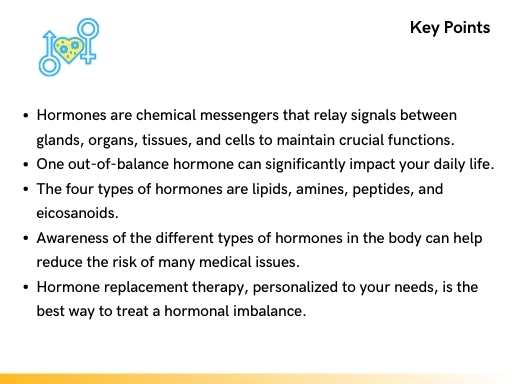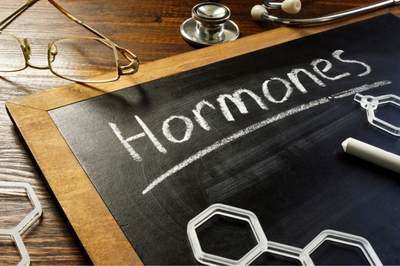 The human body has many moving parts, systems, and functions that keep us healthy and at peak performance. Perhaps the most crucial area to understand is the endocrine system, home to the extensive network of chemical messengers (hormones) that relay signals between the glands, organs, tissues, and cells. Some hormones come from areas of the body other than the endocrine system, including the kidneys, adipose tissue, gastrointestinal tract, liver, and placenta.
The human body has many moving parts, systems, and functions that keep us healthy and at peak performance. Perhaps the most crucial area to understand is the endocrine system, home to the extensive network of chemical messengers (hormones) that relay signals between the glands, organs, tissues, and cells. Some hormones come from areas of the body other than the endocrine system, including the kidneys, adipose tissue, gastrointestinal tract, liver, and placenta.
Every hormone has its target receptor cells. Depending on the hormone, the receptors can be in muscles, fat, bones, skin, the brain – anywhere in the body. Many hormone levels fluctuate based on age, time of the month (especially for women), mood, stress, health, and other factors.
If the body does not produce enough of a specific hormone to reach all its receptor cells, then the functions associated with that hormone may suffer. Human growth hormone (HGH) is a prime example of this, as its levels decrease with age. However, because HGH regulates critical functions, as we will highlight further down, it can lead to serious health, physical, cognitive, and emotional issues.
Why You Need to Be Aware of the Different Types of Hormones in Your Body
Understanding the different types of hormones in the body can help determine when a change is creating a problem for your health or well-being. Hormones play a role in crucial functions, including:
- Food metabolism
- Cellular regeneration
- Mood regulation
- Cognitive functions
- Body temperature maintenance
- Sexual performance
- Reproduction
- Mood
- Immunity
- Hunger and thirst
- Stress management
- Sleep
One out-of-balance hormone can significantly impact your daily life.
What Are Some of the Important Types of Hormones?
The body’s hormones fall into categories, or types, with lipid, amine, and peptide hormones being the most important. Eicosanoids are hormones classified as autocrine/paracrine hormones because they act on the cells that produce them or nearby cells. The four eicosanoids are leukotrienes, prostacyclin, prostaglandins, and thromboxane.
We will look at some of the most common or essential hormones in their categories below:
Lipid (Steroid) Hormones
Steroid hormones are insoluble in water. They are lipophilic (fat-loving) substances that bind to receptors inside the nucleus or cytoplasm of a cell. Lipid hormones require cholesterol for their production. They require a protein to help them move through the bloodstream.
 Testosterone
Testosterone
- What Is It: Although thought of as the male sex hormone, women and men need ample testosterone for many reasons.
- Why You Need It: Testosterone supports a healthy libido, brain functions, hair growth, and muscle and bone growth in men and women. In men, testosterone promotes sperm production. Women need testosterone to support ovarian functions.
- Signs of Deficiency: Decreased sex drive, hair loss, reduced bone density, muscle loss, sleep disturbances, fatigue, and declining cognitive functions are signs of potential testosterone deficiency.
Estrogen
- What Is It: There are three types of estrogen – estradiol, estriol, and estrone, with estradiol being the most common.
- Why You Need It: Estrogen plays an essential role in pregnancy, as it regulates the growth of the uterine lining. It also assists with the male reproductive system. Estrogen also influences the heart, brain, skin, liver, and fat retention.
- Signs of Deficiency: Symptoms such as hot flashes, night sweats, and weak bones can indicate low estrogen levels.
Progesterone
- What Is It: While it is often called the “pregnancy hormone,” progesterone is also a precursor to producing other steroid hormones.
- Why You Need It: Progesterone aids thyroid hormone functions, is an anti-inflammatory, supports nerve functions, normalizes blood clotting, and provides pregnancy support.
- Signs of Deficiency: Infertility is a sign of progesterone deficiency. Miscarriages, abnormal periods, and uterine bleeding are other areas of concern. Low progesterone can lead to high estrogen levels, causing weight gain, gallbladder problems, and decreased libido.
Cortisol
- What Is It: Also known as the stress hormone, cortisol regulates crucial functions, including immune responses, blood sugar levels, and metabolism. Most of the body’s cells contain cortisol receptors, allowing it to act differently depending on the type of cell.
- Why You Need It: Cortisol helps the body react during stress. However, too much cortisol can inhibit testosterone and HGH production and lead to weight gain, high blood pressure, muscle and bone weakness, depression, and other problems.
- Signs of Deficiency: Because too little cortisol is often associated with problems in the adrenal or pituitary gland, it can be life-threatening if left untreated. Symptoms of low cortisol include weight loss, fatigue, muscle weakness, dizziness, mood changes, and dark patches on the skin.
Amine (Amino Acid) Hormones
Adrenaline/Epinephrine
- What Is It: Often called the “flight or fight” hormone, adrenaline works with noradrenaline to prepare the body for stressful situations.
- Why You Need It: Adrenaline expands the airways, increases heart rate and blood pressure, enlarges the pupils to improve vision, sends blood to the muscles, decreases pain sensitivity, and other functions crucial to helping the body get through a stressful or sudden action.
- Signs of Deficiency: Adrenaline deficiency is rare and usually appears in genetic catecholamine enzyme deficiencies. More common is having too much adrenaline, which can lead to rapid heartbeat, sweating, high blood pressure, heart palpitations, and anxiety.
Peptide (Protein) Hormones
Peptide hormones are water-soluble hormones that bind to receptors on the surface of cells rather than entering the cells.
Growth Hormone
- What Is It: Often called the body’s “master hormone” for all it does, growth hormone is vital to protecting the body from premature aging and significant health problems as you age.
- Why You Need It: GH plays a significant role in cell regeneration, metabolism, immunity, cognitive processing, and the production of sex and other hormones.
- Signs of Deficiency: The list of growth hormone deficiency symptoms is long, the most common being insomnia, weight gain, fatigue, muscle loss, aging skin, sexual decline, depression, and bone loss.
Follicle-Stimulating Hormone
- What Is It: FSH is a hormone produced by the pituitary gland that regulates ovary and testes functions.
- Why You Need It: Follicle-stimulating hormone helps promote ovarian follicle growth before ovulation in women and sperm production stimulation (spermatogenesis) in men.
- Signs of Deficiency: Infertility in men or women can be a sign of low FSH levels.
Luteinizing Hormone
- What Is It: LH comes from the anterior pituitary gland and is crucial in regulating testicular and ovarian functions.
- Why You Need It: In the testes, luteinizing hormone tells the Leydig cells to produce testosterone. LH stimulates ovarian follicle production of oestradiol for women during the first two weeks of the monthly cycle. Increased LH levels midway through the cycle stimulate the release of the mature oocyte (egg) from the ovary. Luteinizing hormone also stimulates progesterone production by the corpus luteum to support pregnancy upon fertilization.
- Signs of Deficiency: Low LH levels can lead to infertility as luteinizing hormone is vital for ovarian and testicular functions.
Insulin
- What Is It: Produced by the pancreas, an organ behind the stomach, insulin enters the bloodstream to support glucose uptake by the cells.
- Why You Need It: Insulin tells the cells to take in glucose from the bloodstream as the body’s primary energy source. The cells cannot use glucose without insulin.
- Signs of Deficiency: Too much or little insulin can lead to significant health issues, including diabetes. Low insulin levels can come from problems with insulin production, how the cells respond to insulin signals, or how well insulin works.
What Conditions Are Caused by Hormone Issues?
Hormone deficiency, if left untreated, can increase your risk of many medical issues, including but not limited to the following:
- Cardiovascular disease
- Dementia
 Depression
Depression- Elevated blood pressure
- Gastrointestinal issues
- Headaches and migraines
- High cholesterol
- Infertility
- Metabolic syndrome
- Obesity
- Osteoporosis
- Stroke
- Type 2 diabetes
Hormone deficiency can also lead to premature or accelerated aging.
How Often Do You Need to Check Your Hormone Levels?
It is best to check your hormone levels yearly to avoid problems. The sooner you can catch any imbalance, the easier and quicker it is to correct it. Unless specific symptoms point to a particular hormone, a general panel of the most common hormones is all that most adults need each year.
Estrogen, progesterone, testosterone, DHEA, insulin, cortisol, and a complete thyroid panel are among the most important to check yearly. If you are highly stressed, overweight, or suffer from health issues, getting these tests regularly can help reduce the risk of further problems.
HRT As a Reliable Way to Maintain Your Hormone Levels
Hormone replacement therapy (HRT) is the best option for maintaining proper hormonal balances as you age. Personalized HRT provides the body with targeted hormone replacement based on blood test results and health evaluations. Bioidentical hormones, which match the molecular structure of those produced by the glands and organs, are the safest option.
Two common types of HRT are testosterone replacement therapy (TRT) and HGH therapy. Our doctors customize all hormone treatments using bioidentical hormones for maximum results.
Conclusion
Hormones are crucial for ensuring that all functions in the body occur as needed to support health and well-being. Low hormone levels can lead to significant health issues and illnesses if not treated. Hormone replacement therapy, customized to your needs, is the best way to treat any hormonal imbalance.
FAQ
How many types of hormones are in the human body?
While most online sources report over 50 types of hormones, around 70 different hormones have been documented.
What causes hormonal imbalance?
Hormonal imbalance occurs when any hormone is produced in either too great or too low an amount. Lifestyle, health, genetics, aging, and other factors can contribute to hormone imbalances.
What kind of doctor treats hormone-related conditions?
An endocrinologist is a doctor that specializes in the endocrines system and its hormones. Hormone specialists are the best ones to contact for any hormone-related condition.
What happens if hormone deficiencies go untreated?
If any hormonal imbalance goes untreated, the functions associated with that hormone can suffer. Symptoms of hormone deficiency can interfere with your daily life and well-being.


 Testosterone
Testosterone
 Depression
Depression